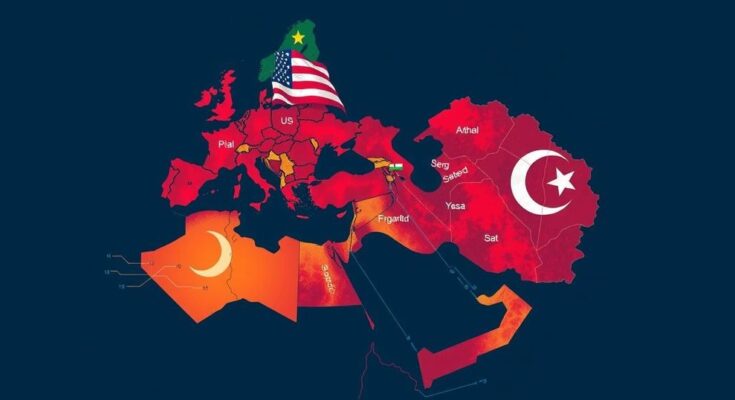The upcoming U.S. election has critical implications for the Middle East, particularly Israel, amidst fluctuating public sentiments towards candidates Donald Trump and Kamala Harris. Trump’s past pro-Israeli policies have garnered significant support, while Harris’s approach emphasizes humanitarian concerns. Both candidates are likely to impact discussions surrounding Iran and Palestinian statehood, though skepticism remains prevalent among Palestinian communities regarding U.S. impartiality. The election outcome will play a pivotal role in shaping future U.S. foreign relations in the region.
In the wake of the upcoming U.S. presidential election, the implications for the Middle East, particularly Israel, are significant and multifaceted. Former President Donald Trump’s prior administration involved substantial shifts in U.S. foreign policy, notably recognizing Israeli territorial claims over the Golan Heights and transforming traditional stances on Middle Eastern conflicts. This historical context sets the stage for how either Trump or Democratic candidate Kamala Harris might influence Israeli interests moving forward. Trump Heights, a symbolic tribute to the former president located in the Golan Heights, serves as a visual representation of the U.S.-Israeli camaraderie during his tenure. Residents, such as Elik Goldberg, express concerns over the current escalation of conflicts, particularly the ongoing war with Hezbollah, which underscores their desire for unwavering U.S. support. The sentiment among Israelis largely favors Trump, with recent polls indicating that approximately two-thirds of the populace would prefer his return to office. Conversely, sentiments towards Kamala Harris reflect a less favorable view, attributed in part to her previous comments regarding Israel’s actions and perceived lack of unconditional support. Public opinion reveals a divide characterized by a preference for a U.S. administration that aligns more closely with Israeli government perspectives. This divide has been exacerbated by the Gaza conflicts, where Harris has called for humanitarian considerations and potential ceasefire negotiations, contrasting with Trump’s approach that emphasizes military outcomes and Israeli victory. For Palestinians, neither candidate inspires confidence. Many, including analyst Mustafa Barghouti, believe that regardless of the outcome, U.S. policy is unlikely to favor Palestinian statehood, and they harbor skepticism about U.S. impartiality towards Israel. The expected approaches to regional challenges, particularly concerning Iran, also delineate potential outcomes. While both candidates seek to counter Iranian nuclear ambitions, Trump’s strategy is projected to be more aggressive, possibly favoring immediate confrontations. In contrast, Harris may emphasize diplomatic efforts before addressing broader geopolitical concerns. In conclusion, the U.S. election presents crucial implications for the Middle East, particularly through the lens of U.S.-Israeli relations, and the perspectives on Palestinian issues. The choice of leadership will fundamentally shape the future dynamics in this volatile region, which are intricately tied to the varied expectations and aspirations of its inhabitants. As both candidates prepare their platforms, stakeholders in the region keenly await the election results, recognizing that the direction of U.S. foreign policy will have profound consequences for their lives and security.
The upcoming U.S. presidential election is poised to significantly impact foreign relations in the Middle East, particularly regarding the United States’ longstanding alliance with Israel. Historical shifts under Trump’s presidency established a precedent of pro-Israel policies, including the recognition of Israel’s sovereignty over the Golan Heights and the prioritization of military strategies. Under Trump’s administration, Israel benefited from a favorable U.S. diplomatic stance that diverged from previous administrations. In contrast, Kamala Harris represents a different approach that may increase emphasis on humanitarian aspects and a potential ceasefire in ongoing conflicts. Understanding the nuances of these differing policies is essential for grasping the broader implications they carry for regional stability and U.S.-Middle East relations.
The outcome of the U.S. presidential election could lead to profound changes in the Middle East’s political landscape, particularly concerning U.S.-Israeli relations and the handling of Palestinian issues. While Trump has historically favored aggressive military strategies and close ties with Israeli leadership, Harris may adopt a more diplomatic approach with a focus on humanitarian governance. As sentiments in Israel lean towards Trump, the Palestinian perspective remains one of skepticism towards both candidates. The implications of this election extend beyond American borders, deeply affecting the geopolitical stability of the entire region.
Original Source: www.bbc.com




